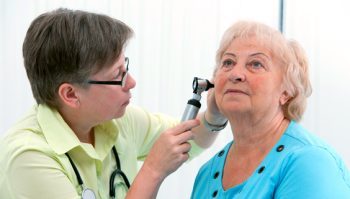 Our healthcare and business law firm works with numerous medical practices in compliance and regulatory matters. Many medical practices are unaware of the requirements of the Americans With Disabilities Act (“ADA”), and in particular the requirements to accommodate individuals with auditory disabilities (including individuals who are deaf or hard of hearing). The ADA does not just prevent disability discrimination by employers. Title III of the ADA applies to “public accommodations.” A public accommodation is a business that is open to the public or provides goods or services to the public and specifically includes a “professional office of a health care provider.” 28 CFR 36.104; Guide to Disability Rights Law, ada.gov. This post provides an overview of the ADA’s auxiliary aids and services requirements and how they apply to medical Practices. If you have questions regarding this blog post or would like to speak with counsel regarding your medical practice, you may contact us at (404) 685-1662 (Atlanta) or (706) 722-7886 (Augusta), or by email, info@hamillittle.com. You may also learn more about our law firm by visiting www.hamillittle.com.
Our healthcare and business law firm works with numerous medical practices in compliance and regulatory matters. Many medical practices are unaware of the requirements of the Americans With Disabilities Act (“ADA”), and in particular the requirements to accommodate individuals with auditory disabilities (including individuals who are deaf or hard of hearing). The ADA does not just prevent disability discrimination by employers. Title III of the ADA applies to “public accommodations.” A public accommodation is a business that is open to the public or provides goods or services to the public and specifically includes a “professional office of a health care provider.” 28 CFR 36.104; Guide to Disability Rights Law, ada.gov. This post provides an overview of the ADA’s auxiliary aids and services requirements and how they apply to medical Practices. If you have questions regarding this blog post or would like to speak with counsel regarding your medical practice, you may contact us at (404) 685-1662 (Atlanta) or (706) 722-7886 (Augusta), or by email, info@hamillittle.com. You may also learn more about our law firm by visiting www.hamillittle.com.
- Medical Practices Must Take Proactive Steps in Certain Situations
The general auxiliary acts and services rule applicable to medical practices is: “No individual shall be discriminated against on the basis of disability in the full and equal enjoyment of the goods, services, facilities, privileges, advantages, or accommodations of any place of public accommodation by any private entity who owns, leases (or leases to), or operates a place of public accommodation.” 28 C.F.R. 36.201. As related to auxiliary aids or services, full and equal enjoyment means (a) a patient cannot be refused access because of his/her disability, (b) effective communication modalities (i.e., auxiliary aids or services) are required, and (c) when necessary to accommodate a patient’s needs, the practice must reasonably modify policies, physical space, and procedures. 28 C.F.R. Part 36.
In not discriminating, a public accommodation “shall take those steps that may be necessary to ensure that no individual with a disability is excluded, denied services, segregated or otherwise treated differently than other individuals because of the absence of auxiliary aids and services, unless the public accommodation can demonstrate that taking those steps would fundamentally alter the nature of the goods, services, facilities, privileges, advantages, or accommodations being offered or would result in an undue burden, i.e., significant difficulty or expense.” 28 C.F.R. 36.303(a). Furthermore, “a public accommodation shall furnish appropriate auxiliary aids and services where necessary to ensure effective communication with individuals with disabilities.” 28 C.F.R. 36.303(c)(1). Importantly, “[a] public accommodation shall not require an individual with a disability to bring another individual to interpret for him or her.” 28 C.F.R. 36.303(c)(2).
- Auxiliary Aids and Services Include a Wide Range of Accommodations
Under the ADA, “auxiliary aids and services” for those who are deaf and hard of hearing include:
“Qualified interpreters on-site or through video remote interpreting (VRI) services; notetakers; real-time computer-aided transcription services; written materials; exchange of written notes; telephone handset amplifiers; assistive listening devices; assistive listening systems; telephones compatible with hearing aids; closed caption decoders; open and closed captioning, including real-time captioning; voice, text, and video-based telecommunications products and systems, including text telephones (TTYs), videophones, and captioned telephones, or equally effective telecommunications devices; videotext displays; accessible electronic and information technology; or other effective methods of making aurally delivered information available to individuals who are deaf or hard of hearing[.]”
28 C.F.R. 36.303(b)(1).
- You Should Consult the Individual on Which Accommodation Will be Effective
A medical practice should consult the individual about which accommodation will be effective for them, however, “the ultimate decision as to what measures to take rests with the [medical practice], provided that the method chosen results in effective communication.” 28 C.F.R. 36.303(c)(1)(ii). If a preferred accommodation is too expensive, the ADA may allow you to choose a less-expensive (but perhaps less effective option). This does not apply to something simply because it is an expense, but only if it would cause an undue burden (i.e. a significant cost and expense). According to the ADA.gov, “Determining what constitutes an undue burden will vary from entity to entity and sometimes from one year to the next. The impact of changing economic conditions on the resources available to an entity may also be taken into consideration in making this determination.” ADA Requirements: Effective Communication
If you have questions regarding this blog post or would like to speak with counsel regarding your medical practice, you may contact us at (404) 685-1662 (Atlanta) or (706) 722-7886 (Augusta), or by email, info@hamillittle.com. You may also learn more about our law firm by visiting www.hamillittle.com.
*Disclaimer: Thoughts shared here do not constitute legal advice.
 Total Health Law Blog
Total Health Law Blog

